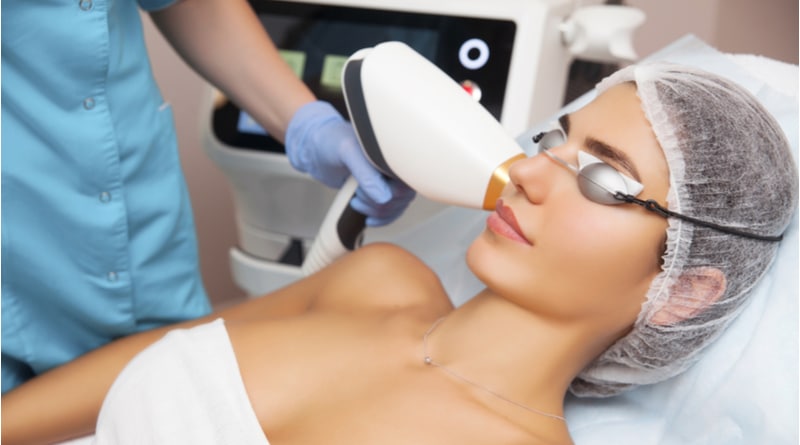What is Laser and Light Treatments?
Laser/light therapy is a non-invasive procedure that uses light energy to repair and regenerate damaged skin.
Laser therapies are medical treatments that use focused light. Unlike most light sources, light from a laser is tuned to specific wavelengths. This allows it to be focused into powerful beams. In medicine, lasers allow surgeons to work at high levels of precision by focusing on a small area, damaging less of the surrounding tissue.
Light therapies provide a relaxing and completely painless experience but they only treat problems closer to the surface of the skin. Laser resurfacing, on the other hand, works much deeper in your skin to improve a number of conditions at their root cause.
What 3rd level courses are available?
Universities and colleges in Ireland are offering courses in Laser and Light Treatments in the following subject areas:
- ITEC Level 4 Diploma in Laser and Light Treatments – This course covers laser hair removal, skin rejuvenation, vascular therapy and specific skin complaint treatments.
- Certificate in Laser and IPL – Learn to identify hair and skin conditions and those clients suitable for Intense Pulse Light and Laser system treatments.
- Level 5 Certificate in Tattoo Removal – Develop a working knowledge of the methods and processes that facilitate a safe working practice.
Studying Laser and Light Treatments in college
There are many courses in Laser and Light Treatments that take place over 1 year to 4 years depending on the course and modules selected. There are also part-time courses and night courses available so you can be sure to fit in your studies no matter what your schedule is like.
Courses will cover theory work through lectures, assignments, tutorials and taught modules. Assessments will take place on a continuous basis with written examinations and practical assignments combined in order to achieve a qualification.
You could also consider work experience or a work shadow in the industry. By job shadowing and carrying out work experience assisting a professional in the field you’ll gain valuable insight, develop your portfolio, build a network of contacts and demonstrate your commitment to the profession. Observation is one of the best ways to learn skills and techniques.
Career options
After completing a Laser and Light Treatments course you will be able to get started in a career that uses specific knowledge of laser and light skin treatments and techniques.
The duties of a Laser Therapist, or anyone skills in the use of laser therapy, include consulting with patients and determining skin ailments, undertaking skin therapy treatment, or performing non-intrusive surgery and referring patients to other specialists if the skin condition does not fall under their skill set.
Working hours will depend on whether you are employed by a facility with set business hours or if you are contracted to various facilities or companies. Hours are full time and a typical work week will be 37.5 hours a week, but you are likely to work at the weekend and in private practice your hours will reflect the needs of your clients.
Related jobs include:
- Laser Therapist
- Laser/IPL Therapy Clinics Manager
- Skin Care Specialist
- Licensed Aesthetician
- Clinical Aesthetician
- Dermatologist
- Dermatologists Assistant
- Plastic Surgeon
- Medical Spa Manager
- Spa Technician
- Spa assistant
- Wax/Hair Removal Specialist
- Beauty Therapist
- Make-Up Artist
- Nail Technician
- Salon Manager
- Salon Owner
- Massage Therapist
- Facial therapist
- Manicurist
- Aromatherapy and holistic therapy specialist
- Health Manager
- Mobile Therapist
- Beauty Therapy Trainer
Further study
After completing a course in Laser and Light Treatments you may choose to pursue further study in a specialist field to increase your knowledge base and skillset. Postgraduate study can also be used as a means to change career focus or to gain professional qualifications required to practice in certain career areas such as Dermatology or Skin Care.
FAQ
What are some uses of laser in surgeries?
Some common laser surgeries include:
- Refractive eye surgery (often called LASIK)
- Tooth whitening
- Cosmetic scar, tattoo, or wrinkle removal
- Cataract or tumor removal
Laser therapy is also used cosmetically to:
- Remove warts, moles, birthmarks, and sunspots
- Remove hair
- Lessen the appearance of wrinkles, blemishes, or scars
- Remove tattoos
Are there different types of lasers?
Different lasers are used for different procedures. For example, carbon dioxide (CO2) lasers make shallow cuts. They’re often used for superficial cancers, such as skin cancer.
Argon lasers also make shallow cuts and can be used to activate photosensitizing (light-activated) drugs during photodynamic therapy. This type of cancer treatment combines light with chemotherapy to kill more cancer cells.
Nd: YAG lasers can travel along optical fibres. They’re used in laser-induced interstitial thermotherapy, a type of cancer treatment.
Low-level laser therapy (LLLT) is also called cold laser therapy. It uses laser light set to wavelengths between 600 and 980 nanometers. The laser is used to perform minor surgeries and promote regeneration in tissue.
Where can I study Laser and Light Treatments?
Explore your options here
Did You Know?
- LASER is actually an acronym for Light Amplification by Stimulated Emission of Radiation.
- Einstein had a role in the discovery of the laser. If it weren’t for his theory of stimulated emission we wouldn’t have lasers today.
- Lasers are grouped into classes. The weakest lasers are eye-safe and are classified as class 1 lasers. The most powerful lasers in the world are class 4 – these are the types of lasers that can start a fire.
- Lasers are used every day, often without you even realising, in items such as CD and DVD players, but they are also used to create everyday objects.
- Lasers are extremely precise and accurate. In fact, measuring using a laser is correct up to a nanometre












Comments